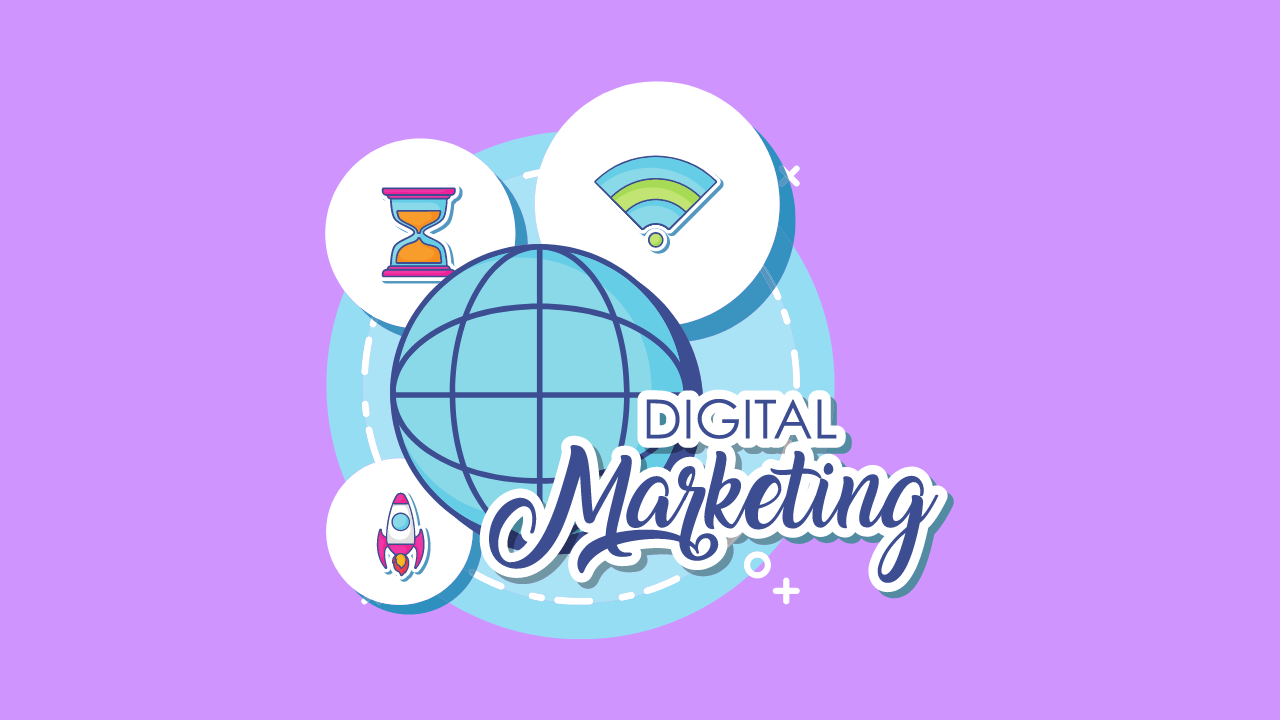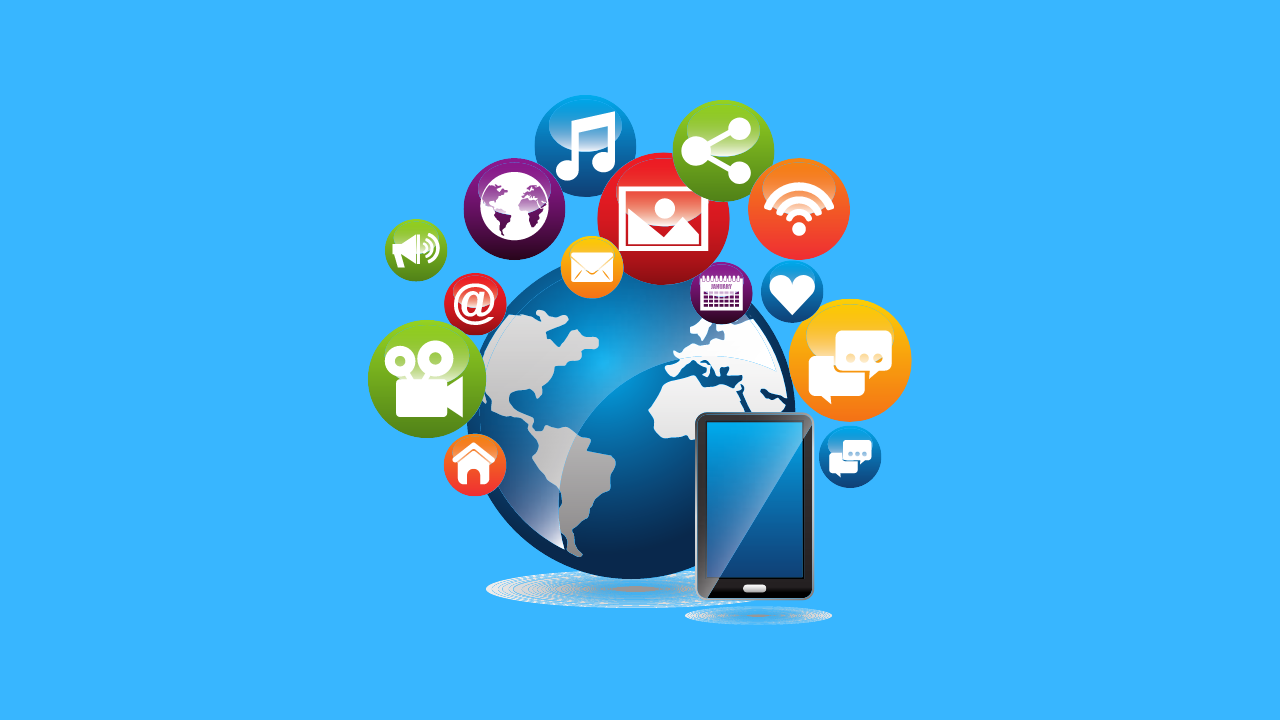Digital marketing is the use of digital channels, such as social media, email, and the internet, to promote a brand, product, or service. It allows businesses to reach and engage with a wider audience, as well as target and personalize campaigns based on specific demographics, interests, and behaviors.
Digital marketing also offers measurable and trackable results, making it easier for businesses to analyze and optimize their marketing efforts.In today's digital age, it's essential for businesses to have a strong online presence and incorporate digital marketing into their overall marketing strategy.
It involves a variety of tactics and strategies, including search engine optimization (SEO), content marketing, email marketing, social media marketing, pay-per-click (PPC) advertising, and affiliate marketing, among others.
The goal of digital marketing is to reach and engage with consumers where they spend much of their time: online. By using digital channels and tools, businesses can connect with their target audience in a more targeted and cost-effective way than traditional marketing methods.
One of the key advantages of digital marketing is its ability to track and measure the success of marketing campaigns. With the use of analytics tools, businesses can track the performance of their campaigns in real-time, allowing them to adjust their strategy and allocate resources more effectively.
Digital marketing has become an essential part of modern business, as more and more consumers are turning to the internet to research products and make purchasing decisions.
Whether you're a small business owner, a marketing professional, or just someone looking to learn more about the field, understanding digital marketing is essential to success in today's digital world.
Digital marketing allows businesses to promote their products and services through various online channels, including social media, email, content marketing, search engine optimization, and pay-per-click advertising.
One of the biggest benefits of digital marketing is its reach and accessibility. With traditional marketing methods, it can be difficult to reach a wide audience, but with digital marketing, businesses can reach a global audience with just a few clicks.
Additionally, digital marketing allows for more targeted and personalized campaigns, as businesses can segment their audience based on specific demographics, interests, and behaviors.
Another advantage of digital marketing is its ability to drive higher conversion rates. By using tactics such as retargeting ads and personalized email campaigns, businesses can increase the likelihood of turning website visitors into customers.
Finally, digital marketing allows for measurable and trackable results. With the use of tools such as Google Analytics, businesses can see how their campaigns are performing and make data-driven decisions to optimize their strategies.
Overall, digital marketing is a crucial part of any business's marketing strategy and cannot be ignored in today's digital age.
What is digital marketing?
Digital marketing is the practice of promoting and selling products or services using digital technologies, such as the internet, social media, mobile apps, and other digital channels.It involves a variety of tactics and strategies, including search engine optimization (SEO), content marketing, email marketing, social media marketing, pay-per-click (PPC) advertising, and affiliate marketing, among others.
The goal of digital marketing is to reach and engage with consumers where they spend much of their time: online. By using digital channels and tools, businesses can connect with their target audience in a more targeted and cost-effective way than traditional marketing methods.
One of the key advantages of digital marketing is its ability to track and measure the success of marketing campaigns. With the use of analytics tools, businesses can track the performance of their campaigns in real-time, allowing them to adjust their strategy and allocate resources more effectively.
Digital marketing has become an essential part of modern business, as more and more consumers are turning to the internet to research products and make purchasing decisions.
Whether you're a small business owner, a marketing professional, or just someone looking to learn more about the field, understanding digital marketing is essential to success in today's digital world.
The Importance of Digital Marketing
In today's digital age, it's essential for businesses to have a strong online presence in order to reach and engage with their target audience.Digital marketing allows businesses to promote their products and services through various online channels, including social media, email, content marketing, search engine optimization, and pay-per-click advertising.
One of the biggest benefits of digital marketing is its reach and accessibility. With traditional marketing methods, it can be difficult to reach a wide audience, but with digital marketing, businesses can reach a global audience with just a few clicks.
Additionally, digital marketing allows for more targeted and personalized campaigns, as businesses can segment their audience based on specific demographics, interests, and behaviors.
Another advantage of digital marketing is its ability to drive higher conversion rates. By using tactics such as retargeting ads and personalized email campaigns, businesses can increase the likelihood of turning website visitors into customers.
Finally, digital marketing allows for measurable and trackable results. With the use of tools such as Google Analytics, businesses can see how their campaigns are performing and make data-driven decisions to optimize their strategies.
Overall, digital marketing is a crucial part of any business's marketing strategy and cannot be ignored in today's digital age.
Types of digital marketing
Digital marketing involves using various online channels and tactics to promote a brand, product, or service to a target audience.From social media marketing to email marketing to search engine optimization, there are countless ways for businesses to reach and engage with their customers online. Below, we’ll explore 10 real-life digital marketing examples in action.
The tasks of a digital marketer may include:
1. Social media marketing
This involves promoting a brand, product, or service through social media platforms such as Facebook, Instagram, Twitter, and LinkedIn. This can include creating and sharing content, running sponsored ads, and engaging with followers.2. Email marketing
This involves sending targeted, personalized emails to a list of subscribers in order to promote a brand, product, or service. This can include newsletters, promotional offers, and event invitations.3. Content marketing
This involves creating and sharing valuable, relevant, and consistent content in order to attract and retain a clearly defined audience. This can include blog posts, videos, infographics, and podcasts.4. Search engine optimization (SEO)
This involves optimizing a website and its content in order to rank higher in search engine results pages (SERPs) and attract more organic traffic. This can include keyword research, on-page optimization, and link building.5. Pay-per-click advertising (PPC)
This involves placing sponsored ads on search engine results pages or other websites, and only paying when someone clicks on the ad. This can include Google AdWords, Bing Ads, and Facebook Ads.6. Influencer marketing
This involves partnering with influential individuals or organizations in order to promote a brand, product, or service to their followers. This can include sponsored posts, product placements, and sponsored events.7. Mobile marketing
This involves promoting a brand, product, or service through mobile devices and platforms. This can include SMS marketing, mobile apps, and mobile ads.8. Video marketing
This involves using video content to promote a brand, product, or service. This can include creating and sharing promotional videos on platforms like YouTube, Vimeo, and Instagram.9. Display advertising
This involves placing ads on websites or apps in order to promote a brand, product, or service. This can include banner ads, pop-up ads, and interstitial ads.10. Affiliate marketing
This involves promoting a brand, product, or service through affiliates who earn a commission for every sale or lead they generate. This can include promoting products through a referral link or banner ad.What does a digital marketer do?
A digital marketer is responsible for promoting a brand, product, or service through digital channels in order to reach and engage with a target audience. This can include tactics such as social media marketing, email marketing, content marketing, search engine optimization, and pay-per-click advertising.The tasks of a digital marketer may include:
- Developing and implementing a digital marketing plan.
- Creating and managing social media accounts and campaigns.
- Writing and sending email marketing campaigns.
- Creating and publishing content for a brand's website and blog.
- Optimizing a website for search engines.
- Running paid advertising campaigns on platforms such as Google AdWords and Facebook Ads.
- Analyzing data and metrics to track the performance of digital marketing efforts.
They should also be skilled in analyzing data and metrics, and be able to use this information to make data-driven decisions. Finally, digital marketers should be able to work effectively in a team and have strong project management skills.
Inbound Marketing vs Digital Marketing
Inbound marketing and digital marketing are often used interchangeably, but they are actually two separate approaches to online marketing. Here is a breakdown of the key differences between inbound marketing and digital marketing:Inbound Marketing
- Inbound marketing is a strategy that focuses on attracting customers through valuable, relevant, and informative content.
- Inbound marketing tactics include creating and sharing blog posts, videos, infographics, and other types of content that provide value to the target audience.
- The goal of inbound marketing is to establish a brand as a thought leader and build trust with potential customers.
Digital Marketing
- Digital marketing encompasses a wide range of tactics that are used to promote a brand, product, or service online.
- Digital marketing tactics can include social media marketing, email marketing, content marketing, search engine optimization, and pay-per-click advertising.
- The goal of digital marketing is to drive traffic and conversions through various online channels.
Is Digital Marketing Effective for All Businesses?
Digital marketing can be effective for all businesses, but it's important to consider whether it aligns with a business's goals and target audience.For example, a local bakery may not see much benefit from running paid advertising campaigns on social media, as their target audience may be more likely to discover them through word-of-mouth or local SEO efforts.
However, a larger e-commerce company with a national audience may find success with paid advertising on social media and Google AdWords, as well as email marketing to drive sales.
On the other hand, a B2B software company may find that content marketing and LinkedIn advertising are more effective in reaching their target audience of business professionals.
It's also important to consider a business's resources and budget when deciding on a digital marketing strategy. Some tactics, such as paid advertising, can be expensive and may not be feasible for businesses with limited budgets. In these cases, focusing on organic tactics such as content marketing and SEO may be more effective.
Ultimately, the effectiveness of digital marketing for a specific business will depend on a variety of factors, including the industry, target audience, and available resources. It's important for businesses to carefully consider their options and determine the tactics that will work best for them.
On the other hand, a B2B software company may find that content marketing and LinkedIn advertising are more effective in reaching their target audience of business professionals.
It's also important to consider a business's resources and budget when deciding on a digital marketing strategy. Some tactics, such as paid advertising, can be expensive and may not be feasible for businesses with limited budgets. In these cases, focusing on organic tactics such as content marketing and SEO may be more effective.
Ultimately, the effectiveness of digital marketing for a specific business will depend on a variety of factors, including the industry, target audience, and available resources. It's important for businesses to carefully consider their options and determine the tactics that will work best for them.
How to Do Digital Marketing
1. Identify your target audience
- Who is your ideal customer?
- What are their demographics, interests, and behaviors?
2. Define your marketing goals
- What do you want to achieve with your digital marketing efforts?
- Are you looking to increase website traffic, generate leads, or drive sales?
3. Create a digital marketing plan
- Identify which digital marketing tactics will be most effective for your business
- Set specific, measurable, achievable, relevant, and time-bound (SMART) goals for each tactic
- Determine budget and allocate resources accordingly
4. Implement your tactics
- Set up and optimize your website
- Create and manage social media accounts and campaigns
- Write and send email marketing campaigns
- Publish content for your website and blog
- Run paid advertising campaigns
5. Measure and analyze results
- Use tools such as Google Analytics to track the performance of your digital marketing efforts
- Identify what's working and what's not
- Make data-driven decisions to optimize your strategy
6. Rinse and repeat
- Regularly review and update your digital marketing plan
- Continuously test and optimize tactics to improve results
- Attend conferences and workshops, read industry blogs and newsletters, and follow thought leaders to stay current.
- The digital marketing landscape is constantly evolving, so it's important to stay up-to-date with online trends.
7. Collaborate with other team members and departments
- Digital marketing often involves working with other team members and departments, such as design, sales, and customer service.
- Collaborate with these teams to ensure that all efforts are aligned and integrated.
8. Hire professionals or outsource as needed
- Depending on the size and resources of your business, you may need to hire additional team members or outsource certain tasks to professionals.
- Consider hiring experts in areas such as search engine optimization, pay-per-click advertising, or social media management.
9. Don't be afraid to experiment and try new things
- Digital marketing allows for a lot of flexibility and experimentation, so don't be afraid to try new tactics and see what works for your business.
- Keep an open mind and be willing to adapt and pivot as needed.
Conclusion!
In conclusion (What is digital marketing?), digital marketing uses digital channels and technologies to promote and market products and services. It allows businesses to reach and engage with consumers where they are spending most of their time: online.
Helpful Articles:




Post a Comment
Please Do Not Enter Any Spam Link In The Comment Thanks.